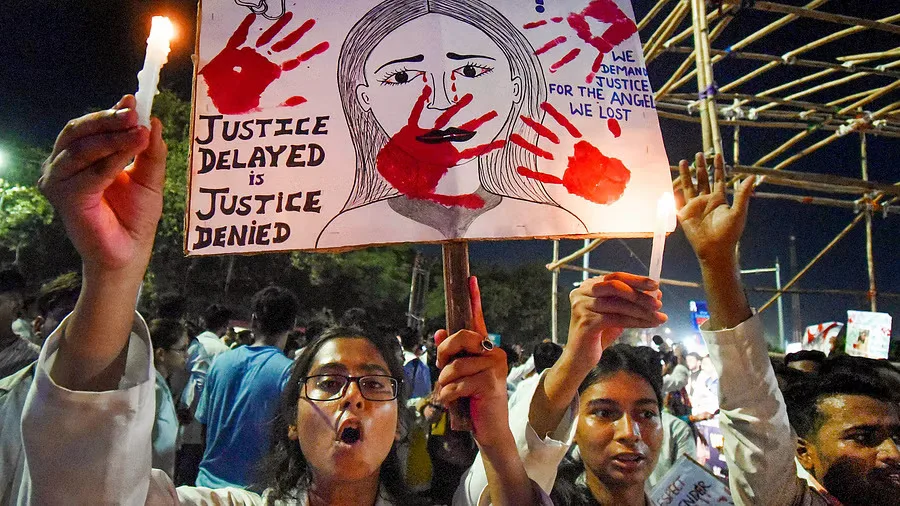

A protesting women against the Kolkata Rape Murder (Image Source: Deccan Herald)
In a significant development during the hearing of the Suo Motu case concerning the rape and murder of a doctor at RG Kar Hospital in Kolkata, the Supreme Court of India expressed grave concerns over the West Bengal Government’s and the police’s handling of the case. The hearing took place on August 20, with a bench led by Chief Justice of India (CJI) DY Chandrachud scrutinizing various aspects of the investigation and response by the state authorities.
At the outset, Chief Justice Chandrachud voiced his deep concern over the widespread dissemination of the victim’s name, photographs, and video clips of the deceased’s body in the media. “This is extremely concerning,” remarked the CJI, highlighting the violation of the victim’s privacy and dignity in the aftermath of the crime.
Senior Advocate Kapil Sibal, representing the State of West Bengal, attempted to clarify the situation, stating that the photographs were taken and circulated before the police had arrived at the scene. Despite this assertion, the Court remained critical of the state’s overall management of the situation.
The Supreme Court also questioned the West Bengal Government regarding the actions of the hospital’s Principal, the delay in filing the First Information Report (FIR), and the vandalism that erupted during a public protest at the hospital on August 14. “After the crime was detected in the early hours of the morning, the Principal of the hospital tries to pass this off as a suicide. The parents are not allowed to see the body for a few hours…” noted CJI Chandrachud, underscoring the mishandling of the initial response to the crime.
Sibal refuted these claims, stating that the information was incorrect and assured the Court that the state would place all relevant facts on record. However, the Court’s concerns deepened when it was revealed that the Principal, who resigned from RG Kar Hospital following the incident, was subsequently assigned the charge of another hospital. “Why was the Principal given the charge of another hospital after he resigned from RG Kar Hospital?” questioned the CJI, probing the state’s decision-making process.
The bench further scrutinized the timing of the FIR’s registration, an essential aspect of the investigation.
Advocate Sibal defended the state, stating that an “Unnatural Death” case was registered immediately, suggesting that there was no undue delay in the FIR’s filing. However, the CJI pointed out discrepancies in the timeline, noting that the autopsy was conducted between 1 PM and 4:45 PM on the day of the incident, and the body was handed over to the victim’s parents at around 8:30 PM for cremation. Despite these actions, the FIR was not registered until 11:45 PM.
CJI Chandrachud questioned this delay, asking pointedly, “FIR is registered at 11:45 at night? Nobody at the hospital registers the FIR? What were the authorities at the hospital doing? Doesn’t autopsy reveal the victim was raped and murdered?” His queries highlighted the apparent negligence in the immediate aftermath of the crime.
Further intensifying the Court’s scrutiny, CJI Chandrachud asked, “What was the Principal doing? Why was it first attempted to pass off as suicide?” These questions underscored the Court’s concern over possible attempts to downplay the severity of the crime.
In response, Sibal informed the Court that the Kolkata police had acted swiftly, arresting the main accused within two days. “The main accused was a civic worker. His Bluetooth was found on the spot, and it connected with his mobile. The CCTV was also there, so we connected,” Sibal explained, detailing the evidence that led to the arrest.
The Court posed critical questions to the State regarding the acts of vandalism that occurred at the hospital on August 14, during a “reclaim the night” protest campaign. The Chief Justice of India (CJI) expressed alarm, stating, “The hospital is invaded by the mob! Critical facilities were damaged. What was the police doing? The first thing the police have to do is to secure the crime scene.”
Solicitor General of India, Tushar Mehta, highlighted the severity of the situation, pointing out, “A mob gathering of 7,000 people won’t assemble without the knowledge and the connivance of the police.” The Court’s concern was echoed in its order, where it noted, “We are unable to comprehend how the authorities were not able to deal with the vandalism.” The Solicitor General further criticised the West Bengal police, emphasising that they were operating under a DIG-in charge who is himself facing various allegations, a point refuted by Senior Advocate Sibal.
In defence of the State’s actions, Sibal informed the Court that over 50 First Information Reports (FIRs) had been registered concerning the vandalism incidents, and 37 individuals had already been arrested. However, the Solicitor General expressed his skepticism at the registration of 50 FIRs, remarking that it was a “recipe for not investigating.”
The Supreme Court also directed the State not to take coercive actions against peaceful protesters and those expressing their views through the media and social media. CJI Chandrachud urged, “Let not the power of the State of West Bengal be unleashed upon peaceful protesters. Let us deal with them with great sensitivity. This is a moment for national catharsis.” Sibal countered by stating that misinformation was spreading in the media, and the State was only acting against those responsible for it.
In its order, the Court observed, “We expect that the Government of West Bengal shall observe necessary restraint in the face of peaceful protests being conducted by any quarter of the society bearing on the issues which form the subject matter of the incident in Kolkata.”
During the hearing, Senior Advocate Aparajita Singh, representing the organisation “Protect the Warriors,” brought to the Court’s attention a grave issue following the vandalism on August 14. She reported that the mob had returned to the medical college hospital, threatening the women doctors with the same fate as the rape victim if they complained. She mentioned that one “brave doctor” had emailed a complaint to the police, and she presented a copy to the bench. The bench took this complaint seriously, with CJI Chandrachud stating, “This is a very serious issue, Sibal,” adding, “The West Bengal Government cannot be unaware of the fact that when there are protests, the other segment will always try and disrupt it.”
CJI expressed deep concern that the mob had called the female doctors by their names and threatened them with the same fate as the deceased. He questioned why the police had fled the scene, asking, “This is not an ordinary complaint which has been made to us now. What is the police doing?”
Justice Pardiwala, part of the bench, questioned whether the same police could be trusted to provide security to the doctors. Responding to this concern, CJI announced that the Court would order the Central Industrial Security Force (CISF) to provide security to the hospital and hostel. Sibal mentioned that the State had no objection to this measure.
The Court, in its order, noted the severe impact of the vandalism on the hospital’s staff, stating, “Out of the 700 doctors who were there at the RG Kar hostel, only 30-40 females and 60-70 males remain after the vandalism incident.” The order emphasised the importance of creating a safe environment for the doctors to return to their duties, stating, “It is essential to create safe conditions for the doctors so as to return to their duties, so that they not only pursue their medical education but also administer medical care.”
The Court further stated, “We are assured by SG Tushar Mehta that CISF shall be deputed in sufficient strength to guard the facilities at RG Medical College, including the hostels where the resident doctors are staying. Sibal says there is no objection since the aim is to safeguard the place.”
The Court also provided a mechanism for doctors to raise safety concerns, allowing them to email the Registrar Judicial of the Supreme Court.
The Court instructed the Central Bureau of Investigation (CBI) to file a status report on the investigation by Thursday, August 22, and requested the State of West Bengal to submit a status report on the investigation into the acts of vandalism.
The case was heard by a bench comprising Chief Justice of India DY Chandrachud, Justices JB Pardiwala, and Manoj Misra, who were addressing the Suo motu cognisance of the rape and murder of a doctor at RG Kar Hospital in Kolkata.
The tragic incident that sparked the case involved the discovery of the body of a post-graduate trainee doctor in the seminar room of RG Kar Hospital on August 9. The Kolkata Police arrested a civic volunteer the next day in connection with the case.
On August 13, the Calcutta High Court directed the CBI to take over the investigation, expressing dissatisfaction with the Kolkata Police’s handling of the case. This order was passed in response to petitions filed by one of the victim’s parents and other concerned individuals.
Recently, the High Court criticised the West Bengal authorities for their failure to prevent the acts of vandalism at RG Kar Hospital during the August 14 protests
Leave a Comment